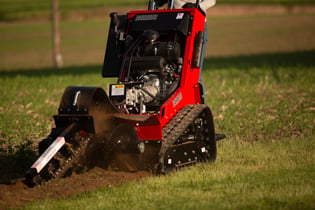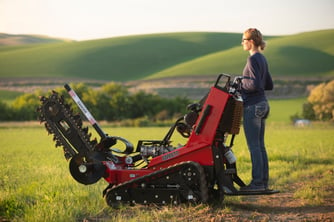Innovative Equipment Engineered to Last
Discover Barreto Manufacturing's 40 years of innovative, durable landscaping equipment, along with expert tips and local highlights for your projects.
Tracked vs. Wheeled? Selecting a Trencher
Trenchers are excellent machines for a variety of tasks, such as sprinkler installation, irrigation, electric cable installation, landscape edging, and more. Quit slinging mud by hand and check out the many advantages to renting or buying a trencher.
 Trenchers come in several different designs, and they are built on either wheels or tracks. Considering these two modes of operation, which is best? It all boils down to your needs and the condition of the job:
Trenchers come in several different designs, and they are built on either wheels or tracks. Considering these two modes of operation, which is best? It all boils down to your needs and the condition of the job: Job Location
The jobsite will determine which size of machine will fit your needs. You wouldn’t want to arrive onsite only to discover that the machine you rented is too wide to fit through a small garden gate or is unable to function in the space you need to work in. Trenching in a small yard space would require a machine with more maneuverability, whereas trenching in a large, open area with lots of ground to cover might require a larger machine. Smaller areas would do well with a wheeled mini or micro trencher, and open areas with fewer obstacles to navigate could do well with a larger tracked trencher.
 Condition/Soil Type
Condition/Soil Type
The soil type, condition of the ground, and the upcoming weather will certainly influence the trencher type you decide to use. You need to assess the soil type to determine which horsepower, chain type, and drive system you need. You can do this DIY Soil test to determine if you have sandy, silty, clay, or loamy soil. For soils that are dry, soft and loamy, a lower horsepower machine and standard or double cup chain will likely be sufficient. For tough, rocky soils a higher horsepower machine paired with an aggressive chain like a combo/shark or bolt-on shark chain will get the job done.
The floatation of track trenchers will help in sandy or wet conditions, and their weight and stability can also be beneficial when working in severely hard or rocky soil. Wheeled trenchers are an excellent option for more mild conditions. Wet weather or harsh conditions can be difficult to work in, so whether you have a tracked or wheeled trencher you will need to exercise caution when navigating.
Job Size & Budget
The size of the job can also indicate which machine to use. Will you be working in a cramped urban backyard or the wide open. sprawl of a garden? Starting out with a machine that is too small or large for the job will increase the amount of time and effort (and money) put in to use it. For quick backyard projects, a wheeled machine is nimble, budget-friendly, and perfect to zip in and out to make good use of your rental hours. For a large space with lots of ground to cover, a  tracked machine with higher horsepower will make better use of your time and resources because it will have the power to get the job done efficiently. Also consider operator comfort - for large jobs covering distances with many hours in the saddle, you may choose a Ride On Tracked Trencher.
tracked machine with higher horsepower will make better use of your time and resources because it will have the power to get the job done efficiently. Also consider operator comfort - for large jobs covering distances with many hours in the saddle, you may choose a Ride On Tracked Trencher.
 Remember: Call before you dig! Underground utilities can be buried close by. Keep your jobsite safe by locating any underground utilities before you trench by calling 811.
Remember: Call before you dig! Underground utilities can be buried close by. Keep your jobsite safe by locating any underground utilities before you trench by calling 811.
